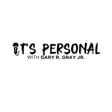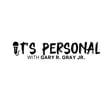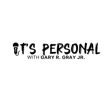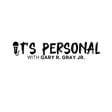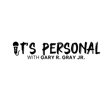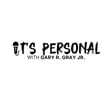Become a Creator today!Start creating today - Share your story with the world!
Start for free
00:00:00
00:00:01

#ItsPersonal Podcast IV 106.Olugbemisola Rhuday-Perkovich on freedom to read, storytelling and media
Olugbemisola Rhuday-Perkovich was born in New York and later moved A LOT. She's spent a lot of time in many different countries, so she was a new kid in many different places (up until 8th grade).
On this podcast, Olugbemisola shares childhood stories with her parents, the freedom to read, the feeling of being in different schools, and the impact of digital media.
Instagram: https://www.instagram.com/olugbemisolarhudayperkovich/
Twitter: https://twitter.com/olugbemisola
Website: https://www.olugbemisolabooks.com/
Transcript
Introduction and Author Experiences
00:00:00
Speaker
I could just read whatever was there. I read a lot of things that went way over my head. I read a lot that I didn't understand and I reread later and was like, oh, I didn't get that. But having that freedom to read was just so enriching and so important and allowed me to really think creatively and think critically about who I was and the world that I was in.
00:00:34
Speaker
I'm Deesha Filia, and I'm the author of The Secret Lives of Church Ladies, a collection of nine stories about black women, sex, and the black church. My name is Jerry Kraft. I'm the author and the illustrator of the graphic novels New Kid and Class Act. My name is Anne Winter, and I am an author of children's books. I live in Austin, Texas.
00:01:00
Speaker
Hi, everyone. Thank you, Gary, so much for having me on. This is a huge pleasure. My name is Andre Fenton. I'm a young adult, author, and poet, spoken word artist from Halifax, Nova Scotia. Hi, Gary. Thank you so much. I am Andrea Wang. I write books for kids and most recently my picture book, Watercress, and my debut middle grade novel, The Many Minutes of Love.
00:01:31
Speaker
It's personal. Welcome back, everyone, to another episode of It's Personal. I always say it, and I'll say it again, I'm super excited to talk to my guests today. And as I've said before, selfishly, I get to talk to really cool people and people that I just choose to. So again, super excited for my guests. I want to allow her to introduce herself.
00:02:00
Speaker
Thank you so much for having me. I'm Olibemi Sola, Ruday Perkovich, and I am super excited to be here. It's morning for me, and this is a great way to start my day with this conversation. No, I am so excited to have you. And I've always, you've always been someone that I admired online and just appreciated so much just in regards to the work that you do for educators, for kids, for authors, et
Childhood Reflections and the Role of Reading
00:02:28
Speaker
cetera.
00:02:28
Speaker
So I'm just excited to zone in on the work that you're doing, a little bit of your background, and if we get to it, some of the projects that you're most currently working on. How does that sound? Sound okay? That sounds great. Yeah, awesome. So let's start. I always like to start like in the beginning. What did it look like for you growing up as a kid and was writing something that you've always wanted to do growing up?
00:02:59
Speaker
I, yes, I would say I think I've always loved writing, reading, it came from reading for me. I was born in New York, then we moved a lot. My parents are both immigrants. My father is Nigerian and my mom was Jamaican. And so with that and with moving around being in different countries sometimes and being a lot in the US, I was a new kid.
00:03:29
Speaker
uh over and over again for every school year up until um eighth grade so that was challenging you know i was a shy kid um
00:03:42
Speaker
But it also, I think, really helped me develop as a writer because I was always going into these places and having to figure them out and sort of having to notice details, really observe, understand the culture of the new school that I was in and the new place that I was in, figure out where I was going to fit in and where I wasn't going to fit in.
00:04:10
Speaker
I use books sort of to help me do that as well. So I would read and sometimes read to sort of practice what I might do or how I might behave, practice the situations that I would imagine myself being in. So that was part of it. And then books were just a joy for me. I grew up in a very
00:04:31
Speaker
storytelling oriented family. So we started with oral storytelling, always having my parents, my grandparents talk about the stories of back home. And my sister and I were always begging us, tell us about when you were a little girl, tell us, tell us, tell us about coming to the country. So and then
00:04:50
Speaker
My parents were big readers. My grandparents were big readers. So we had books all over the home. We were always going to the library. And I had a lot of freedom to read. So I could just read whatever was there. I read a lot of things that went way over my head. I read a lot that I didn't understand and I reread later and was like, oh, I didn't get that. But having that freedom to read was just so enriching and so important.
Literature's Impact on Critical Thinking and Empathy
00:05:21
Speaker
allowed me to really think creatively and think critically about who I was in the world that I was in. And I love how you said the freedom. It's so now as well. Yeah, yeah. The idea of freedom to read. And I want you to, if you can, just expand a little bit more on that. And just in regards to the importance of that in your life and to kids,
00:05:47
Speaker
and adults, I guess, as well today, the idea of the freedom to eat.
00:05:53
Speaker
Yeah, I mean, oh, this is this is one that's so dear to me. And I understand when I see sometimes adults struggle with that for children, like there's like a fear. And but there's also sometimes an ignorance and sometimes like a forgetting or forgetfulness about the fact that all of us are in this world where so many things are happening and so many things are going on.
00:06:22
Speaker
reading about them in a book or not reading about them in a book is not going to make them not happen. So things that you're afraid of children reading about
00:06:34
Speaker
It doesn't mean that they're not already happening in the world. Things that some children are going through are just as valid as things that other children are going through. So all of these experiences that just like I was able to, that kids are able to sort of read about and grapple with and discuss and think critically about through literature helps them and helped me so much be able to operate in the world, be able to be a thinking, empathetic,
00:07:04
Speaker
active person in the world. So take part and want to be productive in society. It's because I did so much reading and have that freedom to read and think and ask questions and develop as opposed to being closed off, as opposed to being restricted, as opposed to being what I would consider uneducated. It's such an important part of my education
00:07:34
Speaker
What I hope that I do as a parent, what I always try to encourage in teaching writing or working with young people in youth development, having that foundation and appreciating that freedom that for the most part we have here, it's getting a little... I hear you, I hear you. It is such a blessing. And if we really care about justice and care about forming
00:08:03
Speaker
who we are in our society, we have to be able to imagine it and we have to be able to think creatively and think critically. And I think reading, believing in stories, understanding stories, creating stories is such a big part of that. Yeah. No, I agree. I think you said everything I was, I was thinking about the idea of, oh, I just, I think just trust. If we believe all of the things that we say about reading and writing, um, we need to trust our kids.
00:08:33
Speaker
You really need to trust and believe that they're going to pick up something, take a look at it. And with guidance, of course, like they're going to have questions, right? So that's what literature does. It allows people to ask questions. And that's where amazing dialogue can happen.
00:08:52
Speaker
Right? Like, yeah. And I was able to, as a young reader, I was able to skip over the parts that I understood I wasn't ready for. I was able to put something down that I didn't think I was ready for. I was able to read something and maybe find someone to ask about it. And that's such a good thing to have those highlights. And yeah.
00:09:16
Speaker
I agree. And I think it goes from every age level, like as soon as we allow our kids to have that freedom to choose and as educators and authors to have the freedom to give them and put those books in their hands, I think it's going to continue to just allow them to understand the world better and the people around them.
00:09:41
Speaker
better as well. So yeah. What you said about trust is so important. And we have to trust them eventually, right? And the crazy part about a lot of this is like, regardless of whether we do or not, if they need something, like they find everything else, they will find it.
Family Influence and Storytelling
00:10:00
Speaker
Exactly.
00:10:03
Speaker
it really yeah and so why not be a part of supporting and nurturing and encouraging and just helping helping our our young people grow helping ourselves grow because we're always still totally needing to do it totally yeah
00:10:40
Speaker
I want to ask you more about the storytelling that happened when you were younger and how much that has influenced you.
00:10:47
Speaker
I guess today in moving forward in the work that you do, you speak about his family members sharing the story. What are some of your fondest memories of some of the stories that have been told to you when you were younger? Oh, and even older, it's funny, I've just recently discovered some new stories from my dad because my daughter was asking him about his experiences. She was doing a project.
00:11:15
Speaker
I learned a whole bunch of things about my dad that I had never heard before and that I had no idea about. So it was really interesting to hear that. For me, I really love, my mom used to talk a lot about the wonder of coming to New York and experiencing certain things for the first time, but also the strong love and connection she had to home, to Jamaica. And she was from the country, like country, country.
00:11:45
Speaker
And what I loved was that she would talk about it so much in really vivid detail so that when, I remember the first time I got to go back to visit, I think it was around six, like for a real visit.
00:12:01
Speaker
It was just like her stories. So it was like my mom had done something magical and just like really precious that she had been able to sort of tell this and then I got to experience it and be like, wow, she was it had almost sounded like fantasy, but it was it was true.
00:12:19
Speaker
And then the humor, my parents both would talk a lot about just sort of funny little things about, which I related to very much about sort of being in a place and feeling a little out of place or not knowing what the customs were or not knowing what to do. And so I would really connect with that just because of all the different schools and all the different community. I love that. Yeah.
00:12:46
Speaker
I love that. And I guess my question will follow up to that. And I've heard you speak about this before, but for selfish reasons, and I always say this, I want to have it here with me on this podcast as well. So with all of that, why do you write? What are the reasons why you write? There's so many reasons why I write. I feel like I
00:13:11
Speaker
I could change the answer each day. There's some days I'm writing because I have questions and I'm just working through questions. There's some stories that are about just a question that I'm trying to not even find an answer to because most of the time I don't think I get an answer to, but it's just working through questions, maybe finding multiple answers, finding multiple points of view.
00:13:34
Speaker
I write because books were such a special friend to me as a young black girl who so often felt unwelcome in a lot of spaces in the world. And I want, I so want to give young people, especially young black children like I was, that feeling that they are loved, that they are respected, that their stories, just their daily, regular, everyday lives are precious and are important and that they can have room to
00:14:04
Speaker
to be funny, to be angry, to be sad, to be vulnerable, to be powerful, just to be all of the different selves that they are.
Diverse Representation in Literature
00:14:12
Speaker
That really is at the heart of why, why I write. And I love that you mentioned the part about they're allowed to be regular, normal. I think that is so important. And I see more and more authors talking about that. And I think it's just, it's beautiful because you know, like,
00:14:31
Speaker
I'm not a big fantasy person, but I enjoy seeing more Black characters in fantasy.
00:14:37
Speaker
Yeah. At the same time, I think that it's important that we normalize the idea of, you know, they can be normal kids going through a normal day and still feel all the things you mentioned. They can be special, right, by doing normal things because, you know, oftentimes like yourself, like growing up and when you do see those books at like the spot and you see yourself and you're dreaming about those things, they can be truly life changing. So I think the more books we have like that where kids can just be normal,
00:15:07
Speaker
and see that normal is okay. Yeah, it can be very beneficial. Just the variety of stories, like I just, the more that we can have all kinds of stories for our kids. I agree, I agree, I agree. Yeah, I think that's, yeah, I think it's so important. I have a few more questions. I know we're kind of
00:15:28
Speaker
Yeah, we're good. We're good. We're good. I want to talk a little bit about your transitioning from different schools. You mentioned in the beginning you were in and out of a lot of schools. And I never, I didn't switch in and out of schools. My track was very much straight and narrow in regards to elementary school, middle school, and high school. So being new,
00:15:55
Speaker
wasn't something I really had to really go through. There's normally a group of people that I went with, but for you it sounded very different, very, very different. So I'm wondering like what was that experience like and what are some of the things you've learned about yourself throughout that journey? I think that those experiences have helped me to be flexible and and creative and
00:16:23
Speaker
adjust quickly, which for the most part is a good thing. I mean, I think sometimes it's, it's good to sort of say, you know what, I'm not going to adjust. I'm not going to, this is my boundary and I'm going to set that. So I think I could use a little more of that, but
00:16:39
Speaker
I think it did help me learn how to be flexible, learn how to sort of move in different, very different spaces. So sometimes I was in the schools in other countries or I was in different types of schools. So I was in traditional public schools. I was in a couple of international schools. I was in just a real variety of school situations.
00:17:07
Speaker
environments where you call the teacher by their first name and others where you stood up whenever an adult came into the classroom. And so I think it, and it has helped me with stories. I love telling school stories. I love sort of getting to know and understand that there can be so many, so many stories in school culture and that there's no, just like anything else, there's no one way that school goes or one way that
00:17:35
Speaker
kids act. What else did I learn? I feel like flexible and creative were very important and just I think having it was a blessing for me because I think it really gave me a foundation for a perspective that includes the diaspora and that wants to think about a global community as far as I can and so that was really an important thing and that has been sort of an important thing
00:18:05
Speaker
for me and my life and the way I think about my writing and my work. Yeah, I think that's so true. I think about how the conversation with someone yesterday about just the idea of the school's systems as well and how there's so many books. There's so many American books by American authors that look like me. But when I read those books, they like I tell when I say they sound identical to how I was raised, how I was brought up in Canada.
School Experiences and Storytelling Flexibility
00:18:32
Speaker
in this little province called Nova Scotia like people are surprised but like it's just it's so fascinating to me that I can read these stories and literally they sound like me going through similar experiences that I gone that I had gone through when I was younger um I think that's so cool I think that's so cool that there's that like interconnection between these two
00:18:57
Speaker
totally different places but at the same time yeah of course there's differences and that's one of the things I want to explore as a writer as well like yeah what what if those characters were Canadian and they're black and they're from a specific place like how can we share those stories so people in other countries that look like us can say oh wow there's people in Canada going through these same experiences
00:19:20
Speaker
right? Yeah, I think school stories are so, so valuable because there's so many things happening. Like we're in an international school in the Philippines. So we spend time in Singapore. Like all those schools run so differently and the kids come from so many different places and go through so many different experiences. So I think, again, there will never be enough books about schools.
00:19:46
Speaker
I know. They're just way too many experiences to go through. Yeah. And they're just, it's just, I think so wonderful. There's so many points of connection and then so many points of specificity that offer opportunities for us to just learn so many new things and just love the familiar at the same time. So yeah. I agree. I agree. I agree. My last question for you is, and you've probably had this question before as well.
00:20:16
Speaker
If you could tell your younger self anything, what would you tell your younger self? What would I tell my younger self? I think I would tell my younger self not to worry so much about, you know, I was definitely a school nerd. I was very concerned with getting good grades and
00:20:43
Speaker
um though I was a little more I figured out ways to kind of be what I'll call rebellious but within so like I would boundaries within the boundary so like I would do things like if I didn't like assignments I would figure out ways to come up with my own assignment and get the teacher to accept it like like that kind of that kind of thing that's just smart
00:21:10
Speaker
That kind of created thinking. But I would tell myself to take even more risks, to not feel like I had to be good at everything I did, to feel like it's okay to, sorry about the noise, to feel like it's okay to try things and fail and know that there's still so much that you win in the failing.
00:21:39
Speaker
that it's worth it. Not to be, I think this is one that everyone says, not to worry so much about what other people think.
00:21:49
Speaker
It's really none of my business. And to move in a way that is thinking less of myself and less of, to get out of myself and out of my head and to think more about the world I'm in and who I want to be in it and how I want to do right in it. Wow. I think, and I think even though that is something that we've heard before, it's still is so relevant
00:22:18
Speaker
and it will remain relevant, I think, just the way the world is. And I do believe social media and the internet, I think it's a beautiful thing. I think there's so many benefits to the internet. But I also think that where we have kids that are literally growing up where the internet is put on this extremely high pedestal, those words
00:22:45
Speaker
ring so true in regards to like just knowing who you are, feeling comfortable with who you are, believing you are enough, which kids are like, I think they're going to need some really strong values and just conversations and then they're going to need to make lots of mistakes and all those things just to understand it because I think it's not, they're not going anywhere, right? Yeah.
00:23:15
Speaker
And we don't need to go. I get heartbroken sometimes because I feel like we do and a lot with media, digital media, we do end up putting so much pressure on kids to want to be more than they are. And it's like when I was in grad school, like
00:23:37
Speaker
800 years ago. And it was like we were talking about, I was doing educational technology and communication and we were talking and narratives and talking about like how the web was going to be so democratizing and like people were going to have opportunities to like express themselves and explore identity. And it in a large part did not turn out the way that we were all thinking it was going to be.
00:24:03
Speaker
And there are some wonderful things that young people can do and are doing using social media and using the internet. And there are so many ways that adults and a lot of people in power are working against that. And it just, it really breaks my heart.
Advice on Digital Citizenship and Future Works
00:24:30
Speaker
Yeah. And I think that's just again,
00:24:32
Speaker
I strongly believe in courses and deep understanding within the schools that allow kids to explore digital citizenship and what does that look like and how your footprint on the internet is, you know, like it's something that you get into and when you post that and people say it and I truly believe it because I've seen it. Like if you post something online, like
00:24:59
Speaker
you need to understand that it can be it most likely we will be there forever. Like anyone can hold on to that image or that video. So kids just need to understand and talk and have conversation, right? Because we all make mistakes. We all post things, share things. We all started from somewhere. I think it's just
00:25:23
Speaker
right now and where these kids are starting with everything else. Because I love, people are always like Instagram, TikTok, there's so many platforms, like kids get their kids everywhere. Yeah, as we mentioned before, you can't avoid them, you can't stop them from being in these places. The more you stop them, the more they're gonna want to be there, right? So why not have
00:25:47
Speaker
the conversations around what this could look like and how you take care of yourself online because it's just unavoidable. It is just unavoidable, right? Just reminding ourselves that we're all, like they're actual people, like on the other end of- Real people. So we're all real people, we're all human and just like having that compassion and that care for each other.
00:26:16
Speaker
It's so important. It is. It is. Brian, I want to thank you so much for hanging out. I could tell you it felt too natural. It was so much fun. Where can people find you online? So I usually am posting pictures on Instagram under my whole name, Olubemi Sola, Ruday Perkovic, and my website, olubemisolabooks.com.
00:26:44
Speaker
Awesome. Awesome. Is there anything that we can, you know, look forward to? Um, so, okay, let's see. So this year I have four books.
00:26:58
Speaker
I do it. It's a little, it's a little much. So I had Operation Sisterhood, a middle grade novel come out beginning of the year. And then I just had last week, middle grade nonfiction, Saving Earth, climate change in the fight for our future.
00:27:17
Speaker
And then in May, I'll have a picture book biography called May Makes a Way. And then in June, I have a YA nonfiction called The Sun Does Shine. It's an adaptation of Anthony Ray Hinton's memoir of his almost 30 years in prison. So it's an adaptation for younger readers. You, my friend, are good.
00:27:40
Speaker
the writing is always so beautiful. So I just, I just thank you. No, I'm not. This is not me. I'm not being kind. This is all real.
00:27:51
Speaker
It was just a fact. It felt a fact. Like, I appreciate it because four books is a lot. And again, you're giving it to educators and kids and, you know, the masses. So as an educator and a reader, I appreciate the work that you do so much. I do. So thank you. Thank you. Thank you. I can't tell you enough how much I appreciate and just how much, especially now, like all over the world, what
00:28:21
Speaker
We've gone through these last few years. The responsibility that educators have had is enormous. And you're doing it with grace and with joy, even in the midst of a lot of pain. I appreciate it so, so much.
